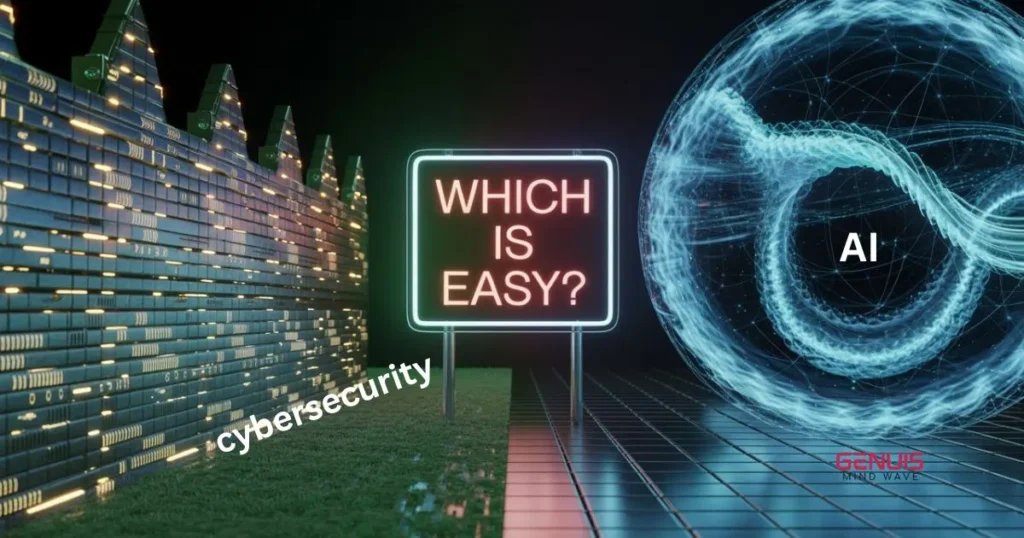Which Is Easy, Cybersecurity or Artificial Intelligence? If you are trying to figure out which field is easier in cyber security and artificial intelligence, this article is for you. It will provide you with the information that will enable you to make a valuable decision for yourself. Cyber security usually offers a smooth start.
AI requires a strong mathematical background and analytical skills to get started. Both fields are useful. If you are beginning, choose your field, keeping in mind your mental capacity and interests, so that you can succeed in it. Let’s start by finding a treasure trove of information.
Definition of cybersecurity
Cybersecurity is the protection against unwanted access to data, networks, and computer systems, as well as theft, damage, or both. It ensures that digital systems operate as intended and supports the protection of personal data.
Cybersecurity is gaining increasing relevance as more people and companies rely on digital technologies. From small companies to large ones, everyone values robust security to stay protected from cyberattacks and hackers.
Why Is It Important?
Cyberattacks are proliferating rapidly in today’s digital environment. For this reason, we require qualified experts capable of
Look for weak points in systems, build robust defenses, and act quickly upon attack occurrences.
Their responsibility is to ensure, when necessary, that data remains private, safe, and available.
Understanding Artificial Intelligence: A Beginner’s Guide
AI refers to when machines mimic human thinking and actions. These include things like learning from data, solving problems, understanding speech, and even seeing things through cameras.
Artificial intelligence combines machine learning, deep learning, and computer vision, among other techniques, to develop intelligent systems. These tools can handle tasks that once required human intervention.
Where Is AI Used?
AI is everywhere now. Doctors are turning to AI for faster disease diagnosis in healthcare. In transport, it powers self-driving cars. In marketing, it helps companies show you ads you might like.
As tech improves, AI will become part of even more things we use every day. That’s why many people are excited to learn about it—and perhaps even build something new with it.
Which is Easier: Cybersecurity or AI?
Now, if you’re wondering which is easier — cybersecurity or artificial intelligence — here’s the deal:
Though they have different difficulties, both disciplines provide one.
Cybersecurity primarily focuses on protecting data and systems. It requires sharp thinking, attention to detail, and an understanding of how hackers operate.
AI can also help create intelligent systems. It requires proficiency in math, coding, and a solid understanding of logic.
If you enjoy puzzles and rules, cybersecurity may feel more approachable. AI might be the right path if you enjoy working with data and building things.
Is Cybersecurity Easier Than Artificial Intelligence?
If you’re starting and wonder, “Which is easier: cybersecurity or artificial intelligence?” you’re not alone.
Many people want to know which path is more straightforward to learn and get into.
Let us dissect it simply here.
What makes cybersecurity simpler?
Cybersecurity typically begins with a more straightforward approach. Beginning with basic IT skills, you can grow in complexity. Getting certificates like Certified Ethical Hacker (CEH) or CompTIA Security+ follows clear rules.
These help you grow step by step. Entry-level jobs are also easier to find once you have some basic training.
So, for many, the path into cybersecurity feels more doable, especially if you’re new to tech.
Why AI Can Be Tougher
Conversely, artificial intelligence (AI) often starts with more difficulty.
It requires a firm grasp of statistics, algebra, calculus, and math overall. You will also need to be proficient in data analysis and programming.
Deep learning or machine learning is not a straightforward subject. One needs time to grasp and apply these concepts. Entering artificial intelligence without technical expertise can feel intimidating.
which choice do you need to make?
The deal is as follows:
If you’re just starting and want something more approachable, cybersecurity might be a simpler option.
AI could be worth the work if you appreciate math, coding, and problem-solving.
Both fields are valuable. It depends on where your interests and strengths lie.
Pick the one that excites you more, and start small. You can always grow from there.
What Are the Key Skills Required for a Career in Cybersecurity?
Examining the abilities each industry requires can help you choose which one—cybersecurity or artificial intelligence—is simpler.
Cybersecurity requires a combination of technical and interpersonal skills. Let’s go over them in simple terms.
Basic Tech Skills You Need
To begin, familiarize yourself with the following concepts:
How networks work
The basics of Windows and Linux systems
Standard security tools like firewalls and antivirus software
These are the building blocks. Without them, it’s hard to move forward.
You’ll also need to learn about
Ethical hacking—finding weak spots before hackers do
Digital forensics—tracking attacks after they happen
Threat detection—spotting danger early
These skills help you protect systems and react when something goes wrong.
Vital Soft Skills
Cybersecurity concerns extend beyond just technology. You also need to think clearly and solve problems fast.
Here’s what else counts:
Analytical thinking—to find patterns in threats
Problem-solving—to fix issues quickly
Communication—to inform others who are not tech-savvy of concerns
Your career can be much improved by your ability to communicate easily with people.
Why Learning Never Stops
The adversaries consistently adapt their strategies. So, you must keep learning.
New tools, new rules, and new attack methods—they all come up often.
That’s why staying updated is a must. You can do this through.
Final Thought
So, is cybersecurity easier than AI?
It can be, especially if you like problem-solving and don’t mind starting with basic tech.
You don’t need to be a mathematician like AI, but you do need to be fast and keep learning new things.
Start small. Build your skills. And grow from there.
Essential Skills Needed for Artificial Intelligence
If you’re trying to decide which is easier, cybersecurity or artificial intelligence, let’s break it down by skills.
1. Programming Languages and Frameworks
AI needs strong coding skills. You should be familiar with Python or R and utilize tools such as TensorFlow or PyTorch. These are the basics for building AI models.
2. Machine Learning and Deep Learning Expertise
You need to understand how learning models work. This includes elements such as neural networks and training data. It’s a big part of what makes AI smart.
3. Data Management and Processing
AI runs on data. You must know how to clean, sort, and use data correctly. Without adequate data, even the best models fail.
4. Analytical and Mathematical Skills
AI uses a lot of math. Topics such as linear algebra and calculus help models learn and make informed decisions.
5. Statistics and Probability
These help AI predict outcomes. Everything from recommendation systems to self-driving cars employs them.
6. Critical Thinking and Problem-Solving
AI will present you with complex problems. You need to think clearly and find smart fixes when models don’t behave as expected.
7. Creativity in Algorithm Design
Occasionally, you may need to create new algorithms or eliminate existing ones. That takes some creative thinking.
8. Logical Thinking and Deductive Reasoning
AI is all about logic. You must be able to follow steps and find patterns in complex problems.
9. Communication and Collaboration Skills
You won’t work alone. Explaining AI concepts to non-technical people and collaborating with teams is crucial.
10. Explaining AI Concepts to Non-Experts
Not everyone will understand AI jargon. You must simplify your ideas so that others can make informed decisions based on your models.
11. Team Collaboration in AI Projects
Most AI projects involve multiple teams, including engineers, designers, and managers. Working well with others is key.
12. Continuous Learning and Adaptability
AI changes fast. New tools and methods are released frequently. So, you must keep learning to stay relevant.
13. Lifelong Learning Mindset
This is true for any tech field, but especially AI: curiosity and the habit of learning never stop.
Cybersecurity vs. Artificial Intelligence: Which Has a Simpler Learning Curve?
Cybersecurity vs Artificial Intelligence – Comparison
1. Entry Requirements
Cybersecurity:
Basic IT knowledge, certifications like CompTIA Security+, CEH
AI:
Strong math, statistics, and programming skills are needed from the start.
2. Learning Curve
Cybersecurity:
It is steeper at first, but gets easier with hands-on practice.
AI:
High from the beginning; involves complex theories and models.
3. Certifications Available
Cybersecurity:
Many entry-level certifications are available.
AI:
Fewer beginner certifications; often need advanced degrees or experience
4. Math & Coding Needed
Cybersecurity:
Basic coding and logic skills are enough for entry-level roles
AI:
Needs strong math (algebra, calculus, probability) and deep coding knowledge
5. Job Roles for Beginners
Cybersecurity:
SOC Analyst, Incident Responder, Compliance Officer
AI:
Very limited; most roles need experience or higher education
6. Salary (Entry-Level)
Cybersecurity:
$65k – $85k per year
AI:
$90k – $120k per year
7. Career Growth Speed
Cybersecurity:
Faster entry and growth due to high demand
AI:
Slower start, but high potential after gaining expertise
8. Ideal For
Cybersecurity:
People who enjoy solving problems, ethical hacking, and protecting systems
AI:
People who love data, math, and building innovative tools
When asking which is easy: cybersecurity or artificial intelligence? The answer is that cybersecurity usually has a more beginner-friendly start.
But both fields have their challenges and rewards. Choose the one that matches your interest—and keep moving forward!
What Are the Career Opportunities in Cybersecurity?
One advantage of cybersecurity is that it opens up many different sectors. You might work in government, banking, healthcare, or even tech startups.
The field changes quickly; hence, you never run out of fresh material to study. It also means lots of opportunities for development and direction choices.
Here’s the simple truth:
Cybersecurity is easier for most people to start with.
You don’t need deep math or coding skills at first.
Entry-level jobs and certifications help you build step by step.
The straightforward reality is that artificial intelligence typically requires more proficiency in math, statistics, and programming at present.
Therefore, cybersecurity could be your best bet if you’re new to technology and seeking a more accessible path.
Start small. Learn one skill at a time. And grow into the role that fits you best.
What Are the Career Paths in Artificial Intelligence?
Demand exists for AI employment. Big IT firms, hospitals, banks, and startups all seek personnel who can create intelligent systems.
The typical team consists of one machine learning engineer, one data scientist, and one AI researcher. The demand for AI professionals is continually on the rise. Most companies rely on AI to enhance goods and services.
Businesses are seeking individuals who can design artificial intelligence models, manage data, and create systems with cognitive and learning capabilities.
Now, here’s a basic comparison between which is easier: cybersecurity or artificial intelligence:
Typically, cybersecurity begins with simple IT knowledge. Through practical experience and qualifications, you can progress methodically.
From the outset, AI often requires robust mathematical, coding, and logical skills. At the beginning level, it is more complicated.
Thus, many find cybersecurity more accessible. However, AI might be worth the effort if you appreciate mathematics, statistics, and developing innovative tools.
Both disciplines provide excellent career development. Choose the one that best fits your aptitudes, and then continue studying as you progress.
Which Is More Beginner-Friendly: Cybersecurity or AI?
For novices, cybersecurity is a better fit. Starting with basic qualifications such as CompTIA Security+, you can advance from there.
Numerous hands-on experiences and clear learning paths are available. That facilitates the progressive development of talents.
Right away, you don’t have to be a top developer or math whiz. Starting requires just basic IT expertise.
What about artificial intelligence?
Though starting AI can be more difficult, it is fascinating.
From the start, it typically requires good math, coding, and logical ability. New students find things like machine learning and deep learning challenging.
However, if you’re willing to invest the time and effort, AI can offer excellent career opportunities.
In Short:
Cybersecurity: Perfect for individuals just starting in technology, with easier access and more hands-on work.
For individuals who appreciate statistics, math, and clever systems, artificial intelligence (AI) offers a tougher start but rewards.
Tools and Technologies Used in Cybersecurity
Cybersecurity experts maintain system and data security using several tools. Among the most often occurring ones are some:
Firewalls:
Firewalls function like digital gatekeepers, blocking harmful traffic.
An antivirus program searches for and deletes malware
IDS system:
This system detects any intrusion and also monitors questionable behaviour.
Instruments of encryption:
This system can access confidential and sensitive information.
Wireshark, Metasploit, and Nessus are also used extensively. These test the system’s security and identify weak points.
If you work in cybersecurity, you must know how to utilise these technologies effectively.
Why is New Tool Learning Important?
The world of cyberspace changes rapidly. Defenders must stay ahead because hackers continuously develop new methods of attack.
Continuous learning is, therefore, essential. You must stay current with the latest tools, styles, and strategies of assault.
Maintaining currency helps you to identify early hazards and improve system protection.
Halt attacks with the correct instruments.
Stay sharp since hackers never stop trying; learn new technologies as they emerge.
Cybersecurity goes beyond knowing one thing well. It’s about being fit for learning and adaptation.
What Tools and Frameworks Are Commonly Used in AI Development?
AI development needs the right tools and frameworks. They can also help build intelligent systems that learn and make decisions.
Among the most widely used programming languages are Python and R. Python is the most popular, offering extensive support and being easy to use.
Key AI frameworks include:
TensorFlow:
Great for building deep learning models
PyTorch:
Often used in research and complex AI projects
Keras:
It makes building neural networks easier, especially with TensorFlow
Some common ones are
Pandas:
Helps organise and manage data
NumPy:
Used for fast math operations on large numbers
Matplotlib:
Matplotlib lets you visualise data using graphs and charts.
These tools help AI pros prepare data, train models, and see results.
If you wish to create actual artificial intelligence apps, you must master these tools. The industry extensively uses them because they streamline tasks through faster, smarter, and more efficient methods.
What Are the Best Learning Resources for Cybersecurity and AI?
You are lucky if you choose to learn cybersecurity. A wide range of courses is available, spanning from basic to advanced levels.
Subjects covered are
- Digital forensics
- ethical hacking
Threat identification
Top certifications, including CompTIA Security+, CEH, and CISSP, are also available for you to obtain. Known in the business, these can advance your career.
Regarding artificial intelligence:
Online learning options also abound for AI.
Courses are on:
Deep learning, machine learning, and the evolution of artificial intelligence
Top sites include EdX, Coursera, and Udacity, which offer comprehensive courses. Even if you are starting from nothing, these enable you to develop actual skills.
Both disciplines offer excellent avenues for learning.
Cybersecurity begins with certainties and practical knowledge.
From the beginning, artificial intelligence demands more math and programming.
Does Cybersecurity or AI Offer Faster Job Opportunities?
Indeed, cybersecurity leads to employment opportunities more quickly. Those with simple certifications, such as CompTIA Security+ or CEH, can find numerous entry-level positions.
There is a severe lack of cybersecurity expertise; hence, companies are hiring quickly. Thus, you can find work quickly if you learn the fundamentals and obtain certification.
Conversely, finding employment in artificial intelligence could take more time. Most artificial intelligence jobs require further education, such as a degree in a field that emphasizes proficiency in math and coding skills.
Still, artificial intelligence is also expanding rapidly. While new jobs are being created as more businesses apply AI tools, these positions usually require advanced skills from the outset.
Cybersecurity:
simpler access with certificates and faster employment
Artificial intelligence requires a more profound understanding and a slower start.
Cybersecurity is an excellent option for those seeking to secure a job quickly. However, if you’re willing to invest more time in learning, artificial intelligence offers fantastic long-term prospects.
Which Field Has a Better Future: Cybersecurity or Artificial Intelligence?
There is considerable scope for both cybersecurity and AI in the future.
The demand for security experts increases in tandem with the growing number of cyber threats. Businesses will always need people to safeguard their systems and data.
Simultaneously, AI is altering our way of life and work. From finance to healthcare, artificial intelligence is developing sophisticated systems and innovative tools.
Which, then, ought one to pick?
Your interests and skills genuinely define it.
Consider a career in cybersecurity if you enjoy protecting systems and solving problems.
If you like arithmetic, statistics, and creating clever tools, AI could be ideal for you.
In essence, cybersecurity presents higher employment growth opportunities now; AI creates opportunities for the next wave of innovation.
Both career paths are good options; the choice ultimately depends on your personal preferences.
Conclusion:
Your background, tastes, and objectives will all determine which cybersecurity and artificial intelligence you prefer.
If you’re starting, cybersecurity is typically more accessible. It offers certifications, such as CompTIA Security+, that enable you to advance gradually, as well as entry-level employment and defined learning paths.
Conversely, AI may first seem more difficult. From the beginning, it typically requires strong arithmetic, coding, and problem-solving skills. On the other hand, if you appreciate data, developing intelligent systems might result in interesting projects with significant influence.
In succinct form:
Cybersecurity:
Simpler beginning, faster employment growth, practical experience,
AI:
Excellent for innovation, but a tougher entrance requires more maths and coding.
Both disciplines offer decent jobs with potential for growth and development.
Thus, while inquiring, which is simpler: artificial intelligence or cybersecurity? For most newbies, cybersecurity is the winner.
Still, choose the one you find most intriguing. That’s how one creates a long-term career.



